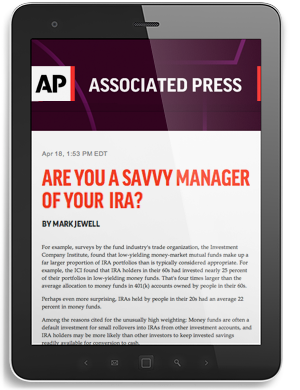Your Money: Taking The Emotion Out Of IRA Investing

Mitch Tuchman, chief executive of Rebalance, came up with the idea for his company – aimed at baby boomers with retirement portfolios of $75,000 or more – after hearing friends burned by Wall Street say they still didn’t want to oversee their portfolios themselves.
“They didn’t trust anyone, but they didn’t want to do it. Yet I couldn’t just build a fund company and charge 1 percent a year,” Tuchman, a hedge-fund veteran, said in an interview. Instead, he built a software service that invests for his clients using low-cost ETFs (exchange traded funds).
Rebalance takes the emotion out of investing by automatically selling funds that have booked big gains and buying others that have hit a bottom.
“People get taken to the cleaners,” said Tuchman, referring to some mutual funds, especially when the fund companies are receiving kickbacks from various distributors.
Rebalance has big guns on its board lending their names to Tuchman’s start-up.
“I believe with every fiber of my being in low-cost index funds,” says Princeton University professor Burton Malkiel, Tuchman’s advisory board member. “That’s what attracted me to Rebalance.”
“I’m also a huge believer in automatic rebalancing, because it forces investors to do the opposite. They usually put money in when everyone’s optimistic. But Rebalance forces you to sell what’s done well and put money in what’s tanked.”
Over the last 15 years, a simple rebalancing of winners and losers would have gifted investors with an extra 1.5 percent over the stock market, Malkiel contends. “While I’m an academic, I like to do things to help investors,” he said. “It was an ideal association” with Rebalance.
Malkiel, best known as a professor of economics and author of the well-known A Random Walk Down Wall Street, was a founding board member of Vanguard Group and is a passionate believer in the power and efficiency of low-cost, diversified, and well-balanced index-based investing.
Both Malkiel and Charles Ellis are advisers to Rebalance. Ellis is a trustee of the Yale University investment committee, and author of Winning the Loser’s Game, in which he advocates low costs leading to higher returns and champions index funds. Ellis and Malkiel are coauthors of The Elements of Investing.
Finally, Jay Vivian, former managing director of IBM Retirement Funds, also helped create the Rebalance portfolios.
Currently, Rebalance’s portfolios are overweighting international bonds – not including Europe or Japan – and are substituting high-quality dividend stocks for bonds in some client portfolios. AT&T 10-year corporate bonds yield 2.5 percent, while the stock’s dividend returns 5 percent a year.
Within bond portfolios, Rebalance is avoiding high-flying fixed-income ETFs. Small-cap stocks and REITs (real estate investment trusts) “have been on a tear,” Malkiel said, “so we’ve been trimming those and buying emerging markets.”
Tuchman says each portfolio is outfitted to the individual client and rebalanced according to his or her targets. And with the fee wars among discount brokers Charles Schwab, Vanguard, PIMCO, and others, Rebalance argues it can trade these ETFs at costs as low as 0.04 percent per trade. The average account’s annual fee is 0.70 percent, Tuchman contends, below what many actively managed mutual-fund managers charge.
Strangely, however, not all board members are investors. Tuchman has his assets in Rebalance – “You’ve got to eat your own cooking,” he said – but Malkiel does not invest.
“The university itself has restrictions on what one can do,” Malkiel explains, saying he doesn’t “have the flexibility.”
Still, Malkiel advocates low-cost index funds, which beat active managers two-thirds of the time and “aren’t conflicted.”







